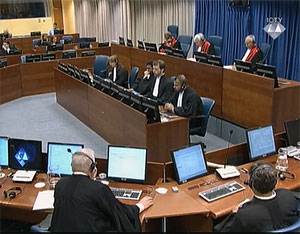Tribunal rejects Ratko Mladić’s request for acquittal

Trial Chamber I today rejected in their entirety Ratko Mladić’s submissions for acquittal made under Rule 98 bis of the Tribunal’s Rules of Procedure and Evidence.
Rule 98 bis states that after the close of the Prosecutor's case, the Trial Chamber shall, by oral decision, and after hearing the submissions of the parties, enter a judgement of acquittal on any count if there is no evidence capable of supporting a conviction.
Ratko Mladić, former Commander of the Bosnian Serb Army (VRS) Main Staff, stands accused of genocide and a multitude of other crimes committed against Bosnian Muslim, Bosnian Croat and other non-Serb civilians in Bosnia and Herzegovina (BiH) from May 1992 to late 1995.
The Trial Chamber dismissed all of the Mladić’s Defence arguments for acquittal on two counts of genocide and charges relating to a number of individual crimes in various other counts of the indictment. The Chamber also dismissed the Defence’s arguments relating to the Accused’s command responsibility for the crimes committed by groups other than the VRS.
The Chamber further dismissed the Defence’s submission on the scope of Rule 98 bis, confirming that it was appropriate to consider motions for acquittal only with regard to entire counts, rather than charges within a count.
The Trial Chamber decided that the Accused has a case to answer on all of the counts in the indictment, on the basis of its consideration that “there is a duty under Rule 98 bis to assess whether there is evidence capable of supporting a conviction on every count of the indictment, irrespective of whether the Defence explicitly challenged all counts.”
In relation to Counts 1 and 2 on the indictment, the Chamber stated that “there is evidence that acts of genocide took place” in the 15 BiH municipalities charged in the indictment, as well as in Srebrenica, and that the “evidence cited also provides information on the perpetrators’ genocidal intent.”
The Trial Chamber further presented its findings about the Prosecution’s case alleging Mladić’s participation in a joint criminal enterprise (JCE). The Chamber found that there is evidence “upon which, if accepted, could be established beyond reasonable doubt that there exited a JCE, composed of, inter alia, members of the Bosnian Serb leadership and the VRS, including Radovan Karadžić and the Accused, the purpose of which was to permanently remove the Bosnian Muslims and/or Bosnian Croats from Bosnian-Serb claimed territories in Bosnia-Herzegovina through the commission of the crimes charged in the Indictment.” In the Chamber’s view, there exists evidence that the Accused significantly contributed to the JCE’s implementation.
Ratko Mladić was initially indicted on 25 July 1995. After having been at large for almost sixteen years, he was arrested on 26 May 2011 and transferred to the Tribunal on 31 May 2011. His trial commenced on 16 May 2012 and the Prosecution concluded its case on 26 February 2014.
The Defence orally presented its motion pursuant to Rule 98 bis on 17 March 2014, and the Prosecution responded on 18 March 2014.
Since its establishment, the Tribunal has indicted 161 persons for serious violations of international humanitarian law committed on the territory of the former Yugoslavia between 1991 and 2001. Proceedings against 141 have now been concluded.

